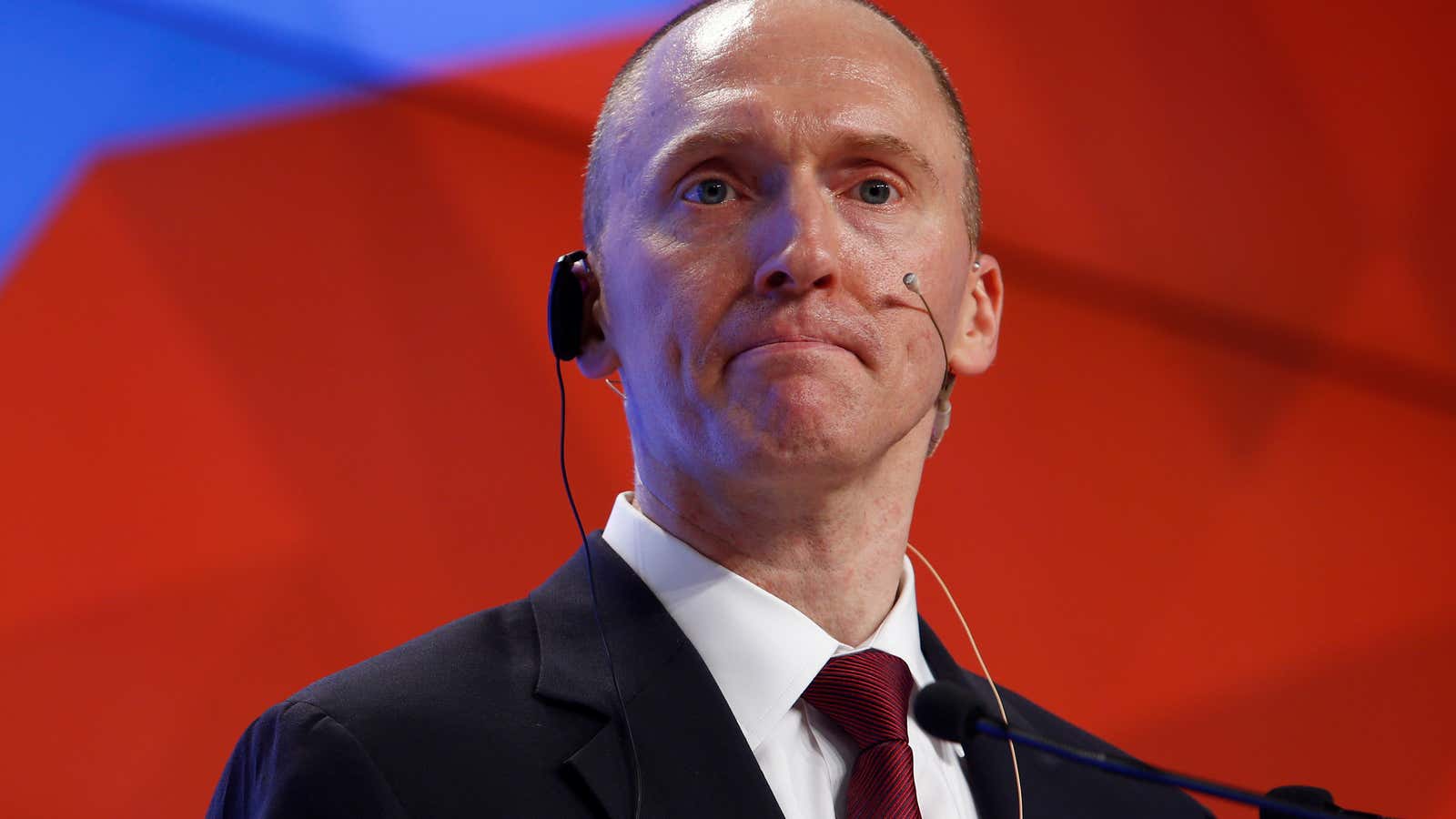 Page in Moscow in December 2016." />
Page in Moscow in December 2016." /> Page in Moscow in December 2016." />
Page in Moscow in December 2016." />
Former Trump campaign foreign policy advisor Carter Page’s recent testimony to Congress was released late on Monday night (Nov. 6) by the House intelligence committee.
The transcript (pdf), some of it redacted for security reasons, paints an alarming picture of an unstable aide, who may have tried to inflate his connections in Russia with the Trump campaign, and openly discussed sensitive US political policy with Russian contacts connected to the government.
AdvertisementIn the rambling, sometimes incoherent, 243-page testimony, given Nov. 2, Page often contradicts himself, and tries to deflect direct questions. He recites his academic credentials multiple times, and appeared without a lawyer, apparently because he is undergoing “personal legal training” himself. The transcript was made public at Page’s request.
Page makes numerous references to the “dodgy dossier,” a reference to the report prepared on Trump by a former British intelligence official. He says it is full of lies and has unfairly destroyed his life—only to then confirm some details of it. He says he never met Donald Trump, or his family members, but his testimony contains several blockbusters that could seriously affect some members of the administration:
Jeff Sessions knew Page traveled to Russia in 2016: The most serious Page allegation concerns now attorney general Jeff Sessions, who testified under oath during his Senate confirmation hearing that he was “not aware” of anyone affiliated with the Trump campaign communicating with the Russian government.
Page said he told Sessions in June of 2016 that he was flying to Moscow the following month, to speak at a Russian university, during a dinner that Sessions arranged for Trump advisors a Republican club on Capitol Hill (p. 67). “I mentioned it briefly to Senator Sessions as I was walking out the door,” Page says, adding later “There was no discussion of substance in any way, shape, or form, that’s for sure,” he says.
AdvertisementSessions failure to tell his fellow senators is sure to alarm Congressional committees investigating Russian interference in the US election, and add to calls for him to step down. Trump advisors Hope Hicks and Corey Lewandowski also knew about the trip, Page said.
Page emailed on the “Ukraine amendment.” In a July 14, 2016 email to Trump aide J.D. Gordon and others, Page wrote “As for the Ukraine amendment, excellent work,” Congressional members remind him (p. 195). The Republican policy on Ukraine was mysteriously changed in July of 2016 to make US support for the country, which is under attack from Russia, weaker. Page’s testimony is sure to renew focus on that change, and why the Trump campaign was softer on Putin.
In Moscow, Page met a top government official. After his July 2016 speech to the Russian university, Page spoke with the deputy prime minister of the Russian federation Arkady Dvorkovich (p. 38), who, Page wrote back to Trump campaign “expressed strong support for Mr. Trump and a desire to work together.”
Page sent another email (p. 40) to the Trump campaign from Moscow saying he was bringing back “insights and outreach” he’d received from “a few Russian legislators and a few members of the Presidential administration here.” Page testified he meant things he’d seen in Russian media.
AdvertisementAfter Page returned from Moscow, 10 academics and journalists he met from his trip kept contacting him… They included Schlomo Weber, the professor who first invited him to Russia, Scholmo’s son Yuval, and Andrej Krickovic , who has taught at UC Berkeley (p. 60).
…about a research project with Russian funding. They were discussing “some research project” that would include joint funding from the “Russia side and the US side.” (p. 63).
He may have discussed US sanctions with Rosneft’s investor relations head. The Russian state-backed oil giant is sanctioned by the US; Page has known IR head Andrey Baranov for about a decade (p. 102). They met in Russia in July and December of 2016 (p. 138), while Page was a Trump advisor. The topic of sanctions “may have come up,” Page said, but he insisted he’d never “had any discussions with him about changing any sanctions policy.”
He suggested Trump travel to Russia in May of 2016. Page was suggesting Trump travel in a campaign event (p. 170) at the same time as George Papadopoulos, an aide who confessed to the FBI to trying to set up meetings between Trump and individuals linked to the Russian government, Congressional members noted.
AdvertisementUSDA nominee Sam Clovis made him sign an NDA. Clovis, who withdrew his name for the agriculture job after Papadopoulos’s confessions to the FBI were made public, forced Page to sign a non-disclosure agreement (p. 146) about his work with the campaign. Clovis had supervised Papadopoulos during the campaign and encouraged him to travel to Russia.
He traveled to Budapest in August of 2016 to meet the Hungarian ambassador to the US. Page first met her at the Republican National Convention, then went for a “long weekend” in Budapest (p. 185), but can’t recall much on what he talked to the pro-Russian government representative about, or who else he met.
Steve Bannon told him to stay off TV. Bannon texted, or maybe called, in January of 2017 before the inauguration, Page recalled, and told him not to do a scheduled MSNBC appearance (p. 200). That’s after Jones Day lawyers for the president told him in a letter not to represent himself as part of the campaign any longer. “Unfortunately, I am the biggest embarrassment surrounding the campaign,” he said.
Our free, fast, and fun briefing on the global economy, delivered every weekday morning.